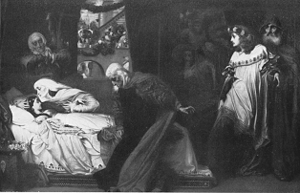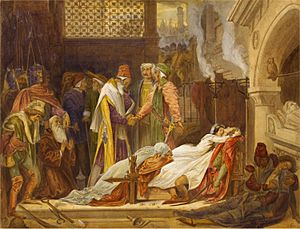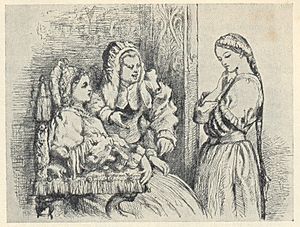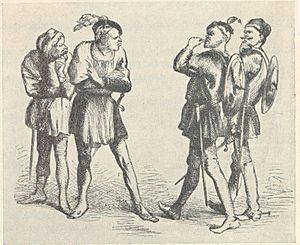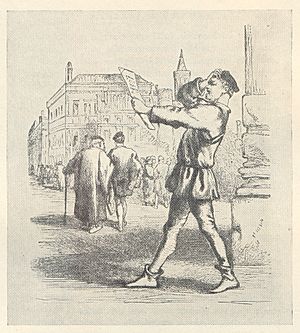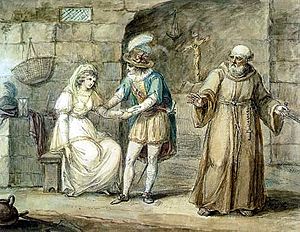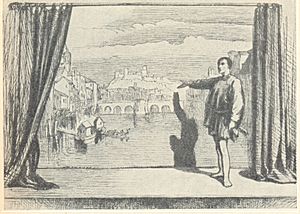Characters in Romeo and Juliet facts for kids
William Shakespeare's famous play Romeo and Juliet tells a sad story set in Verona, Italy. It's all about two main characters, Romeo Montague and Juliet Capulet, who fall in love even though their families are bitter enemies. The play also features many other important people from their families, the city's ruler, and other characters who help or hinder their story.
Contents
House of Escalus
Prince Escalus
Prince Escalus is the ruler of Verona. He tries very hard to stop the fighting between the Capulet and Montague families. He is based on a real family, the Scaligers, who once ruled Verona.
The Prince is the main authority in Verona. He appears only a few times in the play, mostly to give out punishments after big fights. First, he punishes Lord Capulet and Lord Montague for a street brawl. Later, he arrives too late to stop the deadly fights between Tybalt and Mercutio, and then between Tybalt and Romeo.
Prince Escalus wants to execute Romeo for killing Tybalt. But he changes Romeo's punishment to banishment from Verona. This is because Benvolio explains that Tybalt started the fight by killing Mercutio, who was a relative of the Prince.
In the final scene, after Romeo and Juliet die, Prince Escalus declares that Lord Montague and Lord Capulet are responsible for their children's deaths. He angrily tells them that their pointless feud caused many deaths, including his own relatives, Mercutio and Paris. In the end, the Prince is happy the feud has finally stopped, even though it came at a terrible cost.
Count Paris
Count Paris is a relative of Prince Escalus. He wants to marry Juliet. He is described as handsome, quite focused on himself, and very rich.
Paris first appears in the play asking Lord Capulet for permission to marry Juliet.
Mercutio
Mercutio is a cousin of Prince Escalus and Count Paris. He is also a close friend of Romeo and his cousin Benvolio. Mercutio supports the Montague side and dislikes the Capulet family.
Mercutio is known for his long, dramatic speeches, like the famous Queen Mab speech. He is often seen as wild, funny, and free-spirited. His bold personality makes him one of Shakespeare's most popular characters. Mercutio often starts arguments with his sharp humor and insults Tybalt, who is a skilled fighter. It is Tybalt's quick temper that leads to Mercutio's death, Romeo's banishment, and the sad events that follow.
After Tybalt threatens Romeo, Mercutio expects Romeo to fight him. However, Romeo refuses because Tybalt is Juliet's cousin, making him a relative. Not knowing this, Mercutio gets angry and decides to fight Tybalt himself. Romeo tries to stop them, but as he steps between them, Tybalt stabs Mercutio under Romeo's arm.
Before he dies, Mercutio curses both families, saying, "A plague o' both your houses!" He also makes a final joke: "Ask for me tomorrow, and you shall find me a grave man." To get revenge for his friend's death, Romeo kills Tybalt. This leads to Romeo being banished from Verona and the play becoming even more tragic.
House of Capulet
The Capulet family was named after a real group of people in the 13th century. In the play, the Capulets are often shown as the more aggressive family. Much of the conflict in the story starts because of them. We also learn more about their family life than the Montagues'.
Lord Capulet
Lord Capulet is the head of the Capulet family. He is Juliet's father and Tybalt's uncle. He is very rich. He can be bossy but also friendly, like at the ball. When Tybalt tries to fight Romeo, Capulet calms him down and threatens to kick him out if he doesn't control himself. He later does the same to Juliet.
Capulet believes he knows what is best for Juliet. At first, he tells Count Paris that Juliet's consent matters and that Paris should wait and ask her. However, when Juliet is sad about Romeo leaving, Capulet thinks she is grieving for Tybalt. To cheer her up, he suddenly arranges for her to marry Count Paris. He expects her to obey him and accept the proposal.
When Juliet refuses, saying she can "never be proud of what she hates," Capulet becomes furious. He threatens to throw her out onto the streets and calls her many harsh names. He says that God giving them Juliet was a "curse" and that he now wishes they had one less child. He also threatens to send her to prison if she doesn't obey. He then storms off, and his wife also rejects Juliet. He sets the wedding for Thursday, then angrily moves it up to Wednesday. His actions show that Juliet's wishes didn't matter to him until he finds her seemingly dead, and later, truly dead. In the end, he is the one who reaches out to Lord Montague to end their families' feud.
Lady Capulet
Lady Capulet is Lord Capulet's wife and Juliet's mother. She plays a bigger role than Lady Montague. In Act 1, Scene 3, she talks to Juliet about marrying Paris, comparing him to a book. She is happy about Count Paris's interest in her daughter.
When Tybalt is killed, she is very sad and wants revenge on Romeo. In Act 3, Scene 5, she gets very angry with Juliet for refusing to marry Paris. She coldly tells Juliet, "Talk not to me, for I'll not speak a word; do as thou wilt, for I am done with thee." By the end of the play, she is overwhelmed by the sad events. We learn that Juliet's mother had her first child by the time she was 14, Juliet's age. Her husband is much older than her.
Juliet
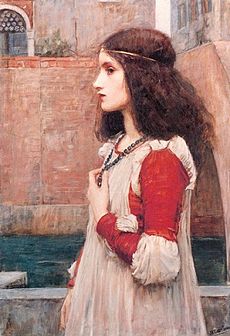
Juliet Capulet is the main female character in the play. She is the only daughter of Lord Capulet, the head of the Capulet family. When she was a child, her Nurse took care of her. The Nurse is now her closest friend and someone she trusts deeply.
Juliet dies at the end of the play. She and Romeo are reunited in death. Both their families finally realize the terrible things they did by trying to keep the lovers apart. Because of this tragedy, the Capulets and Montagues finally end their long-standing fight.
Tybalt
Tybalt is Lady Capulet's nephew and Juliet's hot-headed cousin. He is a very skilled swordsman and acts as the main enemy in the story. Tybalt gets very angry when Romeo and Benvolio show up uninvited at the Capulets' party. Tybalt is named after a character called "Prince of Cats" in an old story, Reynard the Fox. This name is used to both tease and compliment him in the play.
Tybalt first appears helping his servants who are being attacked by Montague servants. He is also at Capulet's feast and is the first to recognize Romeo. His last appearance is in Act 3, Scene 1. There, Mercutio insults Tybalt, and they fight. Tybalt kills Mercutio. In revenge, Romeo kills Tybalt, which leads to Romeo being banished.
Nurse
The Nurse is a very important character in the play. Like Friar Laurence, she is a neutral character, meaning she doesn't take sides in the family feud. She is Juliet's personal servant and was her wet nurse (meaning she breastfed Juliet as a baby). Since she was the main person who raised Juliet, she is Juliet's closest friend and acts more like a mother to her than Lady Capulet does.
Peter
Peter is the Nurse's personal servant. He seems to be a loyal servant, always quick to obey the Nurse. He is scolded for not fighting Mercutio to protect the Nurse's honor. But he says he "saw no man use you a pleasure; if I had, / my weapon should quickly have been out." He also appears in a short, funny scene with musicians.
Gregory and Sampson
Gregory and Sampson are servants of the Capulet family. Gregory is at first unsure about starting a fight. However, Sampson bites his thumb at Abram, which is a big insult. The Montagues then fight back. Benvolio arrives to stop the fight but ends up fighting Tybalt. Both Gregory and Sampson seem to be friends with their master, Tybalt.
In the first scene, they talk using many puns (word jokes) about "coal" and "eye." They try to outdo each other and get ready to fight the Montagues. This quick back-and-forth talk is called stichomythia. Their discussion and fight at the start of the play set the stage for the rivalry and hatred that fills the rest of the story.
Servant to Capulet
A servant of Capulet is sent to deliver party invitations to nobles and friends. While walking, he meets Romeo and Benvolio. He asks them to read the list for him because he cannot read. To thank them, he invites them to the party, not knowing they are Montagues. This character is often played by the same actor as Peter.
House of Montague
The Montague family was also a real group of people in the 13th century. The Montagues are generally shown as the "better" of the two families. They are not seen starting fights and often try to avoid conflict. They sometimes try to convince others to make peace.
Lord Montague
Lord Montague is Romeo's father. He has the same high social status as Lord Capulet, his enemy. He is also very wealthy. Montague clearly loves his son deeply. At the start of the play, he worries about Romeo and asks Benvolio to find out why Romeo is so sad.
After Romeo kills Tybalt, Montague asks the Prince not to execute Romeo. He argues that Romeo only did what the law would have done since Tybalt killed Mercutio. He appears again at the end of the play to mourn Romeo. He has already lost his wife to grief.
Lady Montague
Lady Montague is Lord Montague's wife and Romeo's mother. She is also Benvolio's aunt. She appears twice in the play. In Act 1, Scene 1, she stops Lord Montague from joining the fight. Later, she talks with Benvolio about the same fight. She returns with her husband and the Prince in Act 3, Scene 1, to find out what happened. There, she learns of Romeo's banishment. She dies of grief soon after, which is mentioned in Act 5. She is very protective of Romeo and is happy when Benvolio tells her Romeo wasn't involved in the brawl. However, Romeo doesn't feel close enough to her to ask for advice.
Romeo
Romeo is the main male character in the play. At the beginning, Romeo is sad because he loves Rosaline, but she doesn't love him back. To cheer him up, his cousin Benvolio and his friend Mercutio take him to the Capulets' party in disguise. There, he meets and falls in love with Juliet, the Capulets' only daughter.
Later that night, Romeo and Juliet meet secretly and promise to marry, even though their families have been fighting for a long time. They get married the next day. But their happiness is soon ruined by their families' feud. Juliet's cousin, Tybalt, fights and kills Mercutio. Romeo gets so angry that he kills Tybalt. Because of this, the Prince of Verona banishes Romeo from the city.
Meanwhile, Juliet's father plans for her to marry Paris, a local nobleman, in a few days. He threatens to throw her out if she doesn't agree. Desperate, Juliet asks Romeo's trusted friend, Friar Laurence, for help. Friar Laurence gives her a potion that makes her seem dead. The plan works, but Romeo doesn't find out about it in time. He truly believes Juliet is dead. So, he decides to drink poison, which he buys illegally from an Apothecary (a kind of pharmacist). Romeo's last words are, "Thus with a kiss I die."
Benvolio
Benvolio is Montague's nephew and Romeo's cousin. Benvolio and Romeo are both friends with Mercutio, who is related to Prince Escalus. Benvolio doesn't seem to like the family feud. He tries to avoid fighting Tybalt and tries to stop the duels that lead to Mercutio and Tybalt's deaths.
Benvolio spends most of Act 1 trying to distract Romeo from his crush on Rosaline. After Mercutio appears, Benvolio and Mercutio become closer friends. In Act 3, Scene 1, Benvolio takes the dying Mercutio offstage. He then returns to tell Romeo about Mercutio's death and informs the Prince about what happened. Benvolio then disappears from the play. He is an important character because he is the only young person from either family who survives the play.
Balthasar
Balthasar is Romeo's manservant and trusted friend. They have a close, brotherly relationship. Balthasar is the one who tells Romeo that Juliet is "dead." He appears again in Act 5, Scene 1, giving Romeo the false news. Later, Friar Laurence asks Balthasar where Romeo is, and Balthasar tells him that Romeo is inside the Capulets' tomb. He later confirms Friar Laurence's story by explaining that Romeo entered the tomb and demanded to be left alone.
Abram
Abram is a servant of the Montague household. He appears in Act 1, Scene 1. He and another servant (probably Balthasar) are provoked into a fight with Gregory and Sampson when Sampson bites his thumb at them.
Other Important People
Friar Laurence
Friar Laurence acts as a wise advisor and mentor to Romeo. He also helps make major parts of the story happen.
When he is alone, the innocent Friar gives us a hint of what's to come in his speech about plants and how they are like humans. When Romeo asks the Friar to marry him and Juliet, the Friar is surprised. Just days before, Romeo was in love with Rosaline, who didn't love him back. Still, Friar Lawrence decides to marry Romeo and Juliet. He hopes this marriage will end the long-standing fight between the Capulets and the Montagues.
When Romeo is banished to Mantua for killing Tybalt, the Friar tries to help the two lovers reunite. He gives Juliet a potion that makes her seem dead. However, the Friar's letter explaining the plan doesn't reach Romeo. People in Mantua suspect the messenger came from a house with the plague, so they keep both friars inside. The Friar also can't get to the Capulet tomb in time.
Romeo finds Count Paris weeping near Juliet's body and kills him. Then, believing Juliet is truly dead, Romeo drinks poison. Friar Lawrence arrives just as Juliet wakes up. He urges Juliet not to do anything rash and suggests she join a group of nuns. But he hears a noise and runs away from the tomb. Juliet then decides to take her own life with Romeo's dagger, completing the tragedy. The Friar is forced to return to the tomb. There, he tells the whole story to Prince Escalus and both the Montague and Capulet families. As he finishes, the Prince says, "We have still known thee for a holy man."
Chorus
A Chorus gives the opening speech and one other speech. Both are in the form of a Shakespearean sonnet (a type of poem).
The Chorus is a character who knows everything that will happen. It appears at the beginning of the play to tell the audience about the old fight between the "Two households, both alike in dignity / In fair Verona, where we lay our scene." It returns before Act 2 to hint at the sad events that will happen to Romeo and Juliet's new love.
Unseen Characters
Rosaline
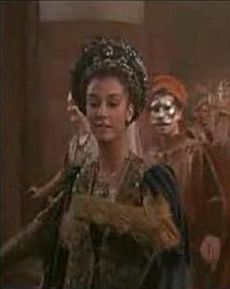
Rosaline is a character we never see in the play. She is Capulet's niece. Even though she doesn't speak, her role is important. Romeo first sees Juliet when he is trying to catch a glimpse of Rosaline at a Capulet party.
Before Juliet, Romeo was very interested in Rosaline, but she did not return his feelings. Many experts compare Romeo's short-lived love for Rosaline with his deep love for Juliet. The poems he writes for Rosaline are not as strong as those for Juliet. Scholars believe his early experience with Rosaline helped prepare him for his relationship with Juliet. Some movies and plays have shown Rosaline more clearly.
|
See also
 In Spanish: Anexo:Personajes de Romeo y Julieta para niños
In Spanish: Anexo:Personajes de Romeo y Julieta para niños
 | Laphonza Butler |
 | Daisy Bates |
 | Elizabeth Piper Ensley |


